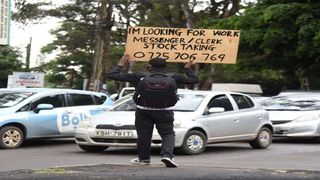
Mr Zacharia Murimi holds a placard asking motorists on a Nairobi street for a job on October 9. He lost his previous job, thanks to Covid-19 economic shocks.
Business
Premium
How Covid-19 switched off lights on economy
What you need to know:
- Covid-19-induced economic downturn has seen an estimated 1.72 million workers lose jobs in three months to June alone.
- Many high-end hotels, which depended on businesspeople for survival, soon found the going tough. Sales were simply not coming.
To some, it was a Wuhan, China, problem. To others, Covid-19 was just a passing cloud. And so the party to mark the end of the decade went on.
Then on March 13, what had been overlooked as a problem some 8,880 kilometres away, finally landed in Kenya aboard a flight.
Nairobi caught the virus first, sneezed and then all facets of the country’s economy caught a cold. Business tanked, resulting in mass layoffs, pay cuts, loan defaults, infections and deaths.
Before long, everybody realised the economy is like one fine thread that ties all sectors and everything in it together. And once it unravels, it goes down with everything else.
From street children in the never-ending search for non-existing leftovers after restaurants close, to the government failing to meet excise duty revenue targets because of shut bars, the Covid-19 pain went beyond the daily deaths and infections.
December. The dust refuses to settle. A health crisis has quickly morphed into an economic crisis that may take years to clear.
“Covid-19 started as a health crisis, became an economic crisis and then a humanitarian crisis. We have to prevent it from ending as a financial crisis,” cautions James Mwangi, the CEO of Kenya’s second largest bank, Equity Group.
Biblical moment
While he is optimistic of a turnaround, Mr Mwangi adds that some businesses may close and never reopen and that the assets that banks hold as security for loans may not find buyers. That is just one part of the economy as many people find themselves in the trying biblical moment of lying on a bed too short to stretch out on and with a blanket too narrow to wrap around themselves.
Data from the Central Bank of Kenya (CBK) shows that gross non-performing loans (NPLs) — credit for which principal or interest has not been paid for 90 days or more — hit Sh403.9 billion in October, up from Sh349.9 billion in February.
This is the fastest 10-month jump in at least five years and has also seen NPLs jump to 13.6 per cent — the highest since August 2007 — when it stood at 14.41 per cent.
The weakening ability of borrowers to honour loan repayment schedules coincides with the tough economic times facing households since the infectious virus hit Kenya in March.
The NPLs surge comes despite banks having allowed customers to extend repayment periods on loans worth Sh1.38 trillion by end of October, an equivalent of 46.5 per cent of the Sh2.97 trillion total loan book.
The National Treasury has already downgraded Kenya’s growth forecast for this year to 0.6 per cent based on the economic fallout from fresh Covid-19 infections, making it the lowest expansion in 12 years.
Wal-Mart Stores founder Sam Walton, who passed on in 1992, had not anticipated the power of a virus when he said: “There is only one boss — the customer. And he can fire everybody in the company from the chairman on down, simply by spending his money somewhere else.”
This time, the boss became the virus. And it simply fired people en masse by weakening the purchasing power of customers and restricting them to their homes.
Retrenchments
Businesses in sectors such as hospitality, horticulture, education, media, aviation and manufacturing have had to issue pay cuts, retrenchments and unpaid leaves as their earnings tumbled.
Covid-19-induced economic downturn has seen an estimated 1.72 million workers lose jobs in three months to June alone.
The ability of those who had borrowed on the strength of payslips to service loans has been tested and found wanting and banks have taken the painful decision to increase provisions for defaults.
With Covid-19, the aviation industry — which has for years helped Kenya earn billions in foreign exchange by facilitating cross-border trade — was now being asked to help keep the virus at bay by grounding planes.
Dark clouds
And so the skies became clear. But not for flying. And soon airlines had to lay off people. And foreign exchange had to dip. For those whose livelihoods hinged on exports — of goods such as flowers, coffee, tea and avocados — the clear sky soon gave way to dark clouds. They too had to lose their jobs.
Firms operating in export processing zones (EPZs) shed 8,135 jobs in the financial year ended June, as the pandemic disrupted export markets, forcing them to trim their workforce as sales dipped.
Many high-end hotels, which depended on businesspeople for survival, soon found the going tough. Sales were simply not coming.
And while about 96 per cent of the hotels have reopened, bed occupancy is still at a paltry 23 per cent. Other sectors will have to pick up in order to put money in people’s pockets before hotels can see a recovery.
From Wuhan, where it all started, to Europe, which has borne the brunt of deaths, infections and economic disruption, a vaccine is coming.
And the world is hoping for a better 2021. But everybody is making baby steps to a new world. Because nobody wants a second crash-landing.





